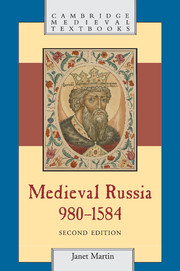Book contents
- Frontmatter
- Contents
- List of illustrations
- Acknowledgments
- Note on names, dates, and transliteration
- Chronology
- List of abbreviations
- 1 The era of Vladimir I
- 2 Princes and politics (1015–1125)
- 3 Kievan Rusˈ society
- 4 Kievan Rusˈ: the final century
- 5 The Golden Horde
- 6 The Russian lands within the Golden Horde
- 7 The Daniilovich ascension
- 8 The unification and centralization of Muscovy
- 9 Muscovite domestic consolidation
- 10 Foreign policy and foreign trade
- 11 Ivan IV the Terrible
- 12 Conclusions and controversies
- Select bibliography
- Index
- Cambridge Medieval Textbooks
9 - Muscovite domestic consolidation
Published online by Cambridge University Press: 05 June 2012
- Frontmatter
- Contents
- List of illustrations
- Acknowledgments
- Note on names, dates, and transliteration
- Chronology
- List of abbreviations
- 1 The era of Vladimir I
- 2 Princes and politics (1015–1125)
- 3 Kievan Rusˈ society
- 4 Kievan Rusˈ: the final century
- 5 The Golden Horde
- 6 The Russian lands within the Golden Horde
- 7 The Daniilovich ascension
- 8 The unification and centralization of Muscovy
- 9 Muscovite domestic consolidation
- 10 Foreign policy and foreign trade
- 11 Ivan IV the Terrible
- 12 Conclusions and controversies
- Select bibliography
- Index
- Cambridge Medieval Textbooks
Summary
From the reign of Vasily II through that of Vasily III, Muscovy steadily expanded its territory and the Muscovite princes asserted their authority over the annexed principalities. These processes were encouraged and justified by various theoretical principles that not only legitimized the right of the Muscovite line of princes to rule but also justified their enhanced powers. The powers ascribed to the grand princes were portrayed in the familiar ceremonial imagery and literary terminology drawn from Byzantine models and Orthodox religious texts. The theories that described grand princely authority thus reflected Muscovy's Byzantine cultural heritage.
But the political system within which the Muscovite grand princes actually functioned was not Byzantine. It was built upon and shaped by economic resources available to the lands within Muscovy. It was created from and fashioned around social and political groups indigenous to Rusˈ society. It was constructed to address the problems posed by rapid expansion, to consolidate Muscovite rule in newly acquired lands, to administer and defend them, and to integrate them into a single cohesive state. As Muscovite princes and advisers confronted such issues, they drew upon not only Byzantine concepts but also the experience and examples of other neighbors, most prominently the Tatars, to design and organize gradually a political and administrative apparatus to govern the unified centralized state of Muscovy.
- Type
- Chapter
- Information
- Medieval Russia, 980–1584 , pp. 298 - 335Publisher: Cambridge University PressPrint publication year: 2007

